If you want to make an impact in the field of health sciences, earning a masters in pharmacy might be a strategic path for you to consider.
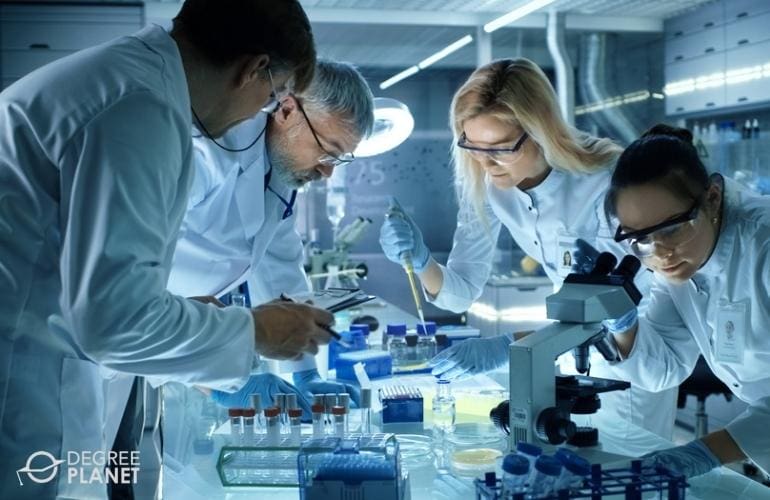
You might pursue this degree if you have an interest in developing a deeper understanding of the human body and how it interacts with medicine, particularly drugs and pharmaceuticals.
Editorial Listing ShortCode:
Graduates with a master in pharmacy can develop highly sought-after skill sets, with career opportunities on the rise in various industries.
Online Masters in Pharmacy Programs
There are a variety of MPharm degree programs online that you can choose from to prepare for a career in the pharmaceutical industry. While all of these degrees fall under the umbrella of pharmacy, each offers a unique focus.
Select the program that most interests you to jump to that section of the guide:
- Masters in Biomedical Science
- Masters in Biotechnology
- Masters in Pharmaceutical Sciences
- Masters in Pharmacogenomics
- Masters in Pharmacology
Regardless of the specialty you select, you will still receive a strong foundation in pharmacy and related courses.
Masters in Biomedical Science
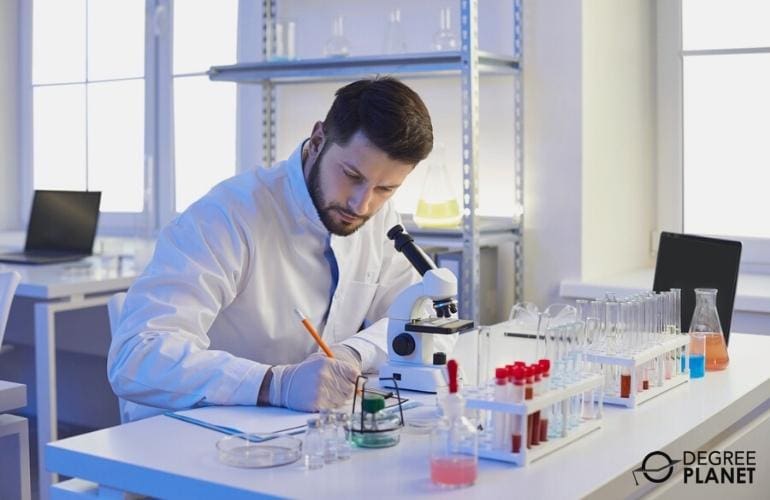
As you narrow down the scope of pharmacy degrees, you might consider a masters in biomedical science. Biomedical science focuses on the intersection of biology and medicine as it affects health care.
Taking a more holistic approach than other degrees, biomedical science focuses on the medical, research, and clinical applications that improve patient health. Students in this program will generally take courses that can prepare them for medical school.
Editorial Listing ShortCode:
As a student of biomedical science, you might take courses in medical cell biology, biochemistry, human anatomy, microbiology, and immunology. This degree may provide you with the advanced research skills needed to pursue a career in research and development, public health, epidemiology, scientific writing, or pharmaceuticals.
Masters in Biotechnology
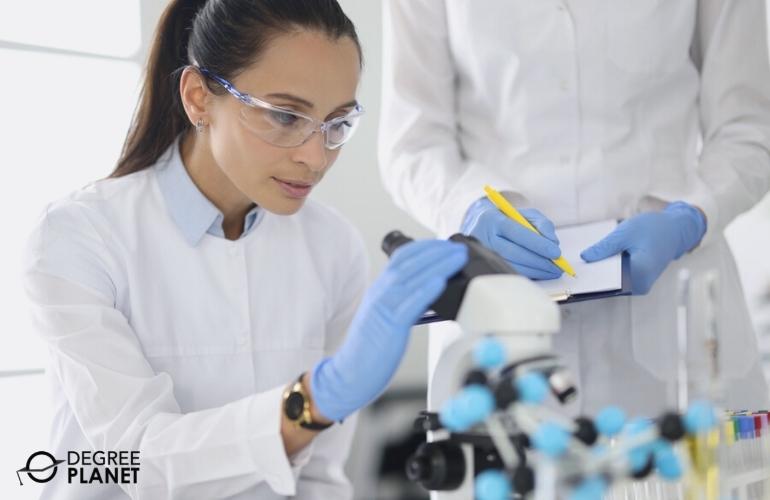
A masters in biotechnology degree can help you develop science, leadership, and entrepreneurial skills that you could apply to a career in the pharmaceutical industry.
Many programs allow you to choose a concentration in biotechnology, including regulatory science, business, manufacturing, operations, and research and analysis. While courses will vary depending on your concentration, classes may include topics on biochemistry, drug development and approval, research ethics and integrity, and intellectual property.
Editorial Listing ShortCode:
Biotechnology is a fast-growing field with many career opportunities available to graduates. Government regulatory agencies, pharmaceutical companies, and biotechnology start-ups are just a few employers of biotechnology graduates.
Masters in Pharmaceutical Sciences
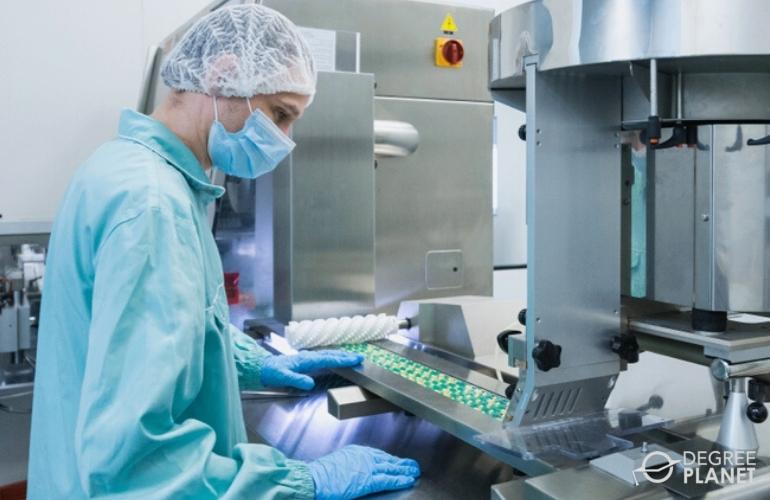
An on-campus or online masters in pharmaceutical sciences emphasizes designing, generating, testing, and determining the efficacy and safety of drugs used in healthcare.
Pharmaceutical scientists research and analyze how the human body changes a drug, with the goal of maximizing its safety prior to general use. Course topics you might take include pharmaceutical science and biochemistry, research skills and ethics, cellular physiology, pharmacokinetics, and drug metabolism.
Editorial Listing ShortCode:
Some graduates go on to become pharmaceutical scientists, biomedical and clinical researchers, and specialists in regulatory affairs.
Masters in Pharmacogenomics
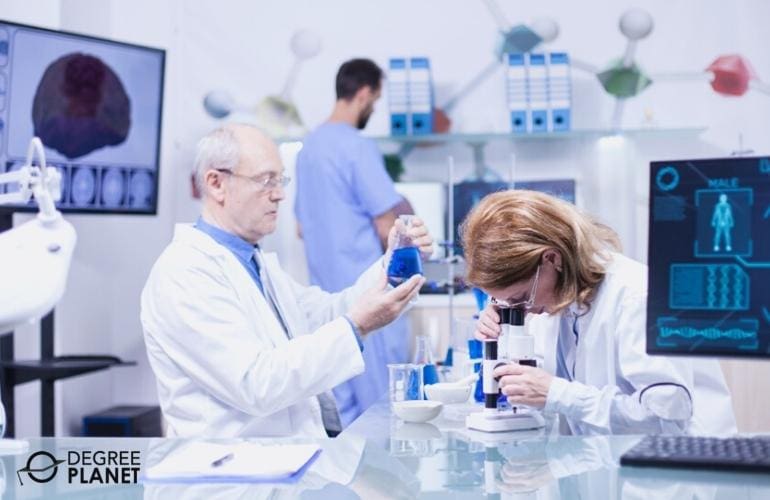
Those who pursue a graduate degree in pharmacogenomics will be in a unique position to study how our genes affect how we respond to medications.
Pharmacogenomics focuses on customizing treatment for each individual, covering a wide range of healthcare needs, from cancer therapy to drug development. Courses may include topics on ethics in genetics, clinical pharmacogenomics, medical molecular genetics, and molecular biology.
Editorial Listing ShortCode:
There is a wide range of career opportunities in the public and private sectors, including geneticists, genetic data analysts, lab technicians, or research project managers.
Masters in Pharmacology
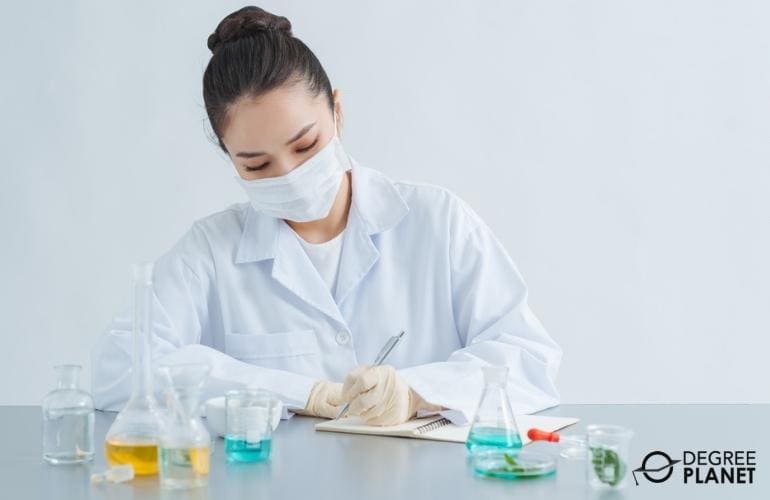
Students of this program will focus on improving the efficacy of drugs by analyzing and evaluating how the human body reacts to a drug. While pharmaceutical sciences focuses on how drugs change within the body, pharmacology focuses on how the body changes in response to a drug.
Pharmacology students may take courses in cellular physiology, experimental design and biostatistics, drug metabolism, and biochemistry. Pharmacology graduates often seek careers in pharmaceutical and biotechnology industries as industry scientists, clinical researchers and laboratory staff, or biomedical researchers.
Editorial Listing ShortCode:
Other industries of employment include business and academia. Professionals in these fields may work as pharmaceutical product representatives, medical writers, or postsecondary teachers.
Pharmacy Careers & Salaries
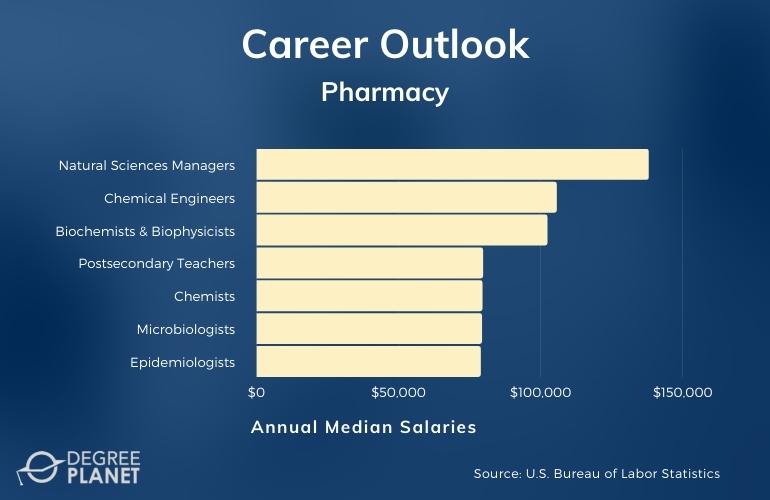
After earning your pharmacy masters degree, a wide variety of careers in both the public and private sectors may be available for you to pursue.
According to the Bureau of Labor Statistics, there are various types of pharmacy careers in a range of industries.
| Careers | Annual Median Salaries |
| Natural Sciences Managers | $137,900 |
| Chemical Engineers | $105,550 |
| Biochemists and Biophysicists | $102,270 |
| Postsecondary Teachers | $79,640 |
| Chemists | $79,430 |
| Microbiologists | $79,260 |
| Epidemiologists | $78,830 |
| Technical Writers | $78,060 |
| Clinical Laboratory Technologists and Technicians | $57,800 |
| Biological Technicians | $48,140 |
You may choose to utilize your research skills in a laboratory setting, focusing on drug development and design or analyzing the efficacy and safety of existing pharmaceuticals.
Editorial Listing ShortCode:
You may also find satisfaction in using your skills in drug regulation, genetic counseling, academia, or direct patient care. The type of jobs you qualify for may also depend on your prior education and experience. Some pharmacy masters graduates, especially those who want to become medical scientists, go on to pursue doctoral studies.
Master of Pharmacy Curriculum & Courses
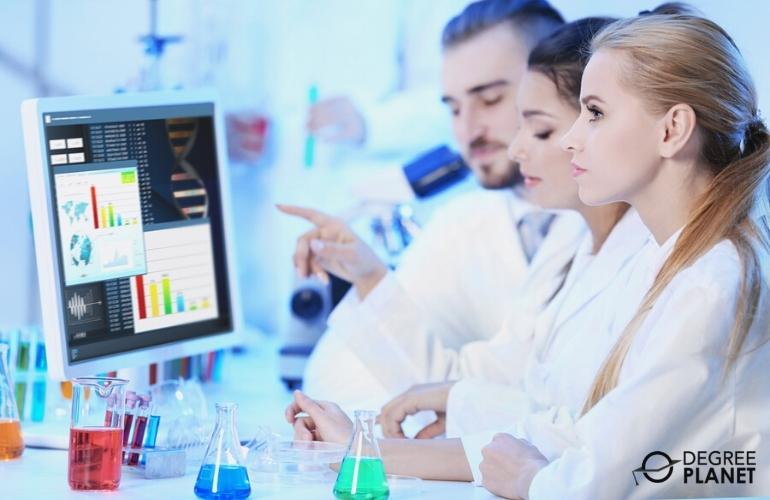
Master in pharmacy courses focus on developing your research, analysis, and science skills. Some programs emphasize business skills as well.
You may be required to complete some of the following courses as part of your program:
- Biochemistry: In this course, you’ll study chemical reactions at the molecular level in living organisms.
- Molecular Biology: This course will focus on how molecules operate and how they react to chemical changes.
- Ethics in Health Sciences: You’ll explore ethical analysis and evaluation in topics such as research, confidentiality, career development, and conflicts of interest.
- Pharmacology: In this course, you’ll gain an understanding of drug development and how drugs interact with the human body.
- Drug Metabolism: This course will explore the chemical alteration of drugs in the body and how this information is used in drug development.
- Medical Physiology: You’ll understand the human body’s physiological functions and gain a foundation for understanding disease development.
- Biostatistics: In this course, you’ll analyze and interpret statistical methods and data that can be used in scientific research.
- Medical Immunology: This course will provide a basic understanding of the immune system at the cellular and molecular level as well as the immune system’s role in fighting disease.
- Molecular Genetics: In this course, you’ll study genes at the molecular level, with a focus on innovative techniques, such as cloning and gene therapy.
- Pharmacogenomics: This course will provide you with an understanding of the role genes play in the body’s response to medication.
In addition to science-based courses, you may also take courses in pharmacy leadership or business, depending on the concentrations offered through your school.
MS in Pharmacy Admissions Requirements

While admissions requirements will vary, below are some common requirements you may be expected to have before pursuing your masters degree in pharmacy:
- Minimum college GPA. Some schools place an emphasis on grades in science and math-related courses.
- Resume of research and professional experience. Some schools require a resume or CV detailing your relevant experience or publications.
- Minimum GRE score (if required). A growing number of schools are no longer requiring GRE scores.
- Bachelor degree in a science field. Some schools require an undergraduate degree in biology, chemistry, physiology, or other science-related fields.
In addition to the criteria listed above, some schools may require at least one letter of recommendation as well as your postsecondary transcripts.
Accreditation

The accreditation process ensures that educational institutions meet a set standard of quality. Schools that are regionally accredited are the most widely recognized.
Accreditation can play a factor in your admissions process, as some masters programs only accept bachelor degrees from a regionally accredited institution. If you choose to pursue a doctoral degree, some institutions only accept a masters degree that was earned at a regionally accredited school.
Editorial Listing ShortCode:
Employers may also look favorably upon degrees earned from accredited institutions, so accreditation could also affect your job opportunities after graduation. You can find school accreditation information on the US Department of Education’s website.
Financial Aid and Scholarships

As you look into pharmaceutical degrees, you may explore different opportunities to help you finance your education.
If you’re already employed in healthcare or a pharmaceutical-related field, your employer might offer financial assistance or reduced tuition with specific educational institutions. You might also explore scholarship opportunities that are available through public, private, and non-profit institutions.
Funding may also be available through federal or state loans and grants, if you qualify. Federal work-study programs may also be available. You can visit the Federal Student Aid website to learn more about the opportunities that might be available to you.
What Degree Do You Need to Be a Pharmacist?

Pharmacists are required to have a Doctor of Pharmacy (PharmD). If you are exploring a potential career as a pharmacist, you might pursue an undergraduate or graduate degree in math or science-related fields, such as biology, chemistry, statistics, or physiology.
Prospective pharmacists need to gain a strong understanding of pharmaceutical chemistry, pharmacology, and pharmacognosy. Once you have your undergraduate degree, you can often go on to earn your Doctor of Pharmacy online or on-campus degree. Some doctoral programs require you to take the Pharmacy College Admissions Test (PCAT) for acceptance into a doctorate program.
What Can You Do with a Masters in Pharmacy?
A masters in pharmacy may provide graduates with career opportunities in pharmaceuticals, healthcare, postsecondary education, research and development, and drug regulation.
You may also look into innovative and cutting-edge opportunities in gene therapy, cancer prevention and cures, genetic counseling, or designing and developing new pharmaceuticals. According to the Bureau of Labor Statistics, careers such as biochemists, biophysicists, and genetic counselors often make higher than average salaries. They also have positive job outlooks, with career opportunities on the rise.
How Long Does It Take to Get a Master Degree in Pharmacy Online?

The length of time needed to complete an MPharm degree will depend on various factors. These factors include the exact number of credits in your chosen program, your program’s thesis requirements, and your course schedule.
For a 36 credit hour program with no thesis, you can likely complete it in 1 year of full-time courses, including summer enrollment. If your program requires a thesis, it may take longer to complete. It may also take longer if your course schedule is part-time.
Is a Masters Degree in Pharmacy Worth It?

Yes, a masters degree in pharmacy is worth it for many students. There will likely always be a need for pharmaceutical knowledge and expertise in many industries.
According to data from the Bureau of Labor and Statistics, life, physical, and social science jobs are expected to grow 7% over the next ten years. With a wide variety of career options in this quickly developing field, a masters in pharmacy degree is a strategic choice for those looking to improve the field of healthcare through medicine.
Editorial Listing ShortCode:
Since there are a number of specialized degrees related to pharmacy, you can choose the path that best aligns with your interests and goals.
Universities Offering Online Masters in Pharmacy Degree Programs
Methodology: The following school list is in alphabetical order. To be included, a college or university must be regionally accredited and offer degree programs online or in a hybrid format.

Drexel University offers a Master of Science in Drug Discovery and Development. This program aims to help students develop the knowledge and technical skills required in the pharmacology field. It requires the completion of 38 credit hours and is housed entirely online. Many graduates pursue careers in settings like biotechnology firms, pharmaceutical companies, research facilities, academia, or nonprofits.
Drexel University is accredited by the Middle States Commission on Higher Education.

Massachusetts College of Pharmacy and Health Sciences offers a Master of Science in Pharmaceutical Economics and Policy. Students interested in promoting public health may find an excellent fit in this program. The program requires the completion of 36 credits and either a thesis or final project. Students can attend classes fully online.
MCPHS is accredited by the New England Commission on Higher Education.
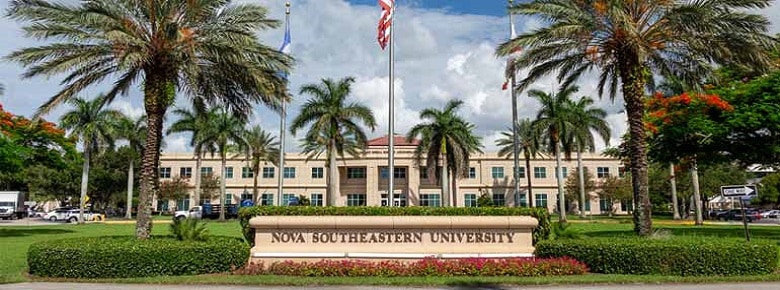
Nova Southeastern University offers a Master of Science in Pharmaceutical Affairs. Discovery, innovation, advocacy, and optimal patient care are at the center of the program’s curriculum. Classes can be attended either in-person or online. Most students can complete the program’s 38 required credit hours in 1 year of full-time attendance.
Nova Southeastern University is accredited by the Southern Association of Colleges and Schools Commission on Colleges.

Ohio State University offers a Master of Science in Health-System Pharmacy Administration. This program is intended for students pursuing pharmacy leadership roles in healthcare. Potential courses include Health System Finance, Advanced Leadership Principles, and Planning, Leading, and Managing the Pharmacy Enterprise. Students can complete their coursework through on-campus or fully online attendance models.
The Ohio State University is accredited by the Higher Learning Commission.

Stevens Institute of Technology offers a Master of Science in Pharmaceutical Manufacturing. This interdisciplinary program combines concepts from business, engineering, health sciences, and chemistry fields.
Students can complete the program’s degree requirements 100% online. Classes cover topics like quality assurance, best manufacturing practices, statistical methods, and manufacturing of sterile pharmaceuticals, medical devices, and biopharmaceuticals.
Stevens Institute of Technology is accredited by the Middle States Commission on Higher Education.

The University of California—Irvine offers a Master of Science in Pharmacology. This program may be an ideal next step for individuals interested in advancing their careers in pharmaceuticals, biotechnology, research, or academia. The convenient online learning model is designed with working professionals in mind. Students can typically complete this program in 2 years.
UCI is accredited by the Western Association of Schools and Colleges Senior College and University Commission.

The University of Cincinnati offers a Master of Science in Pharmacy Leadership. The curriculum covers concepts like conflict management, mentorship, strategic planning, cultural competencies, and team building. Most students can complete the program’s 30 required credit hours in 20 months of part-time attendance. All classes are housed entirely online.
The University of Cincinnati is accredited by the Higher Learning Commission.

The Master of Science in Pharmacy program at the University of Georgia offers a concentration in International Biomedical Regulatory Sciences.
It seeks to teach students how to uphold regulatory standards for pharmaceuticals, medical devices, biologics, and combination products. The program can be completed fully online. To graduate, students must complete 39 credits. Their studies culminate with either a thesis or a non-thesis project.
The University of Georgia is accredited by the Southern Association of Colleges and Schools Commission on Colleges.

The University of Maryland—Baltimore offers a 100% online program for a Master of Science in Pharmacometrics. Graduates often pursue roles in settings like pharmacology, engineering, and epidemiology.
Courses cover topics such as pharmacokinetic and pharmacodynamic modeling, statistics, dose-response, trials, and negotiation techniques. Students attending part-time can typically finish in 8 semesters, while full-time students can often finish in 5 semesters.
UMBC is accredited by the Middle States Commission on Higher Education.

The University of Washington offers a Master of Pharmaceutical Bioengineering. Students interested in drug discovery, clinical drug and device development, molecular biology, or pharmacology may find an excellent fit in this program.
The program utilizes a blend of asynchronous online coursework and synchronous virtual coursework. On average, students can complete the program’s 39 required credit hours in 2 years.
The University of Washington is accredited by the Northwest Commission on Colleges and Universities.
Getting Your Masters in Pharmacy Online

Earning a masters in pharmacy degree online can help you develop the necessary skills to make your mark on the ever-evolving world of pharmaceuticals and medicine.
You may be on the cutting edge of designing and developing life-changing drugs, ensuring patient safety through drug regulation, or increasing our understanding of human genetics. Career opportunities in this field tend to offer higher-than-average salaries, and they’re projected to see continued job growth over the next ten years.
To pursue or advance a career in this innovative and growing field, you can look into online masters of pharmacy programs from accredited universities.

